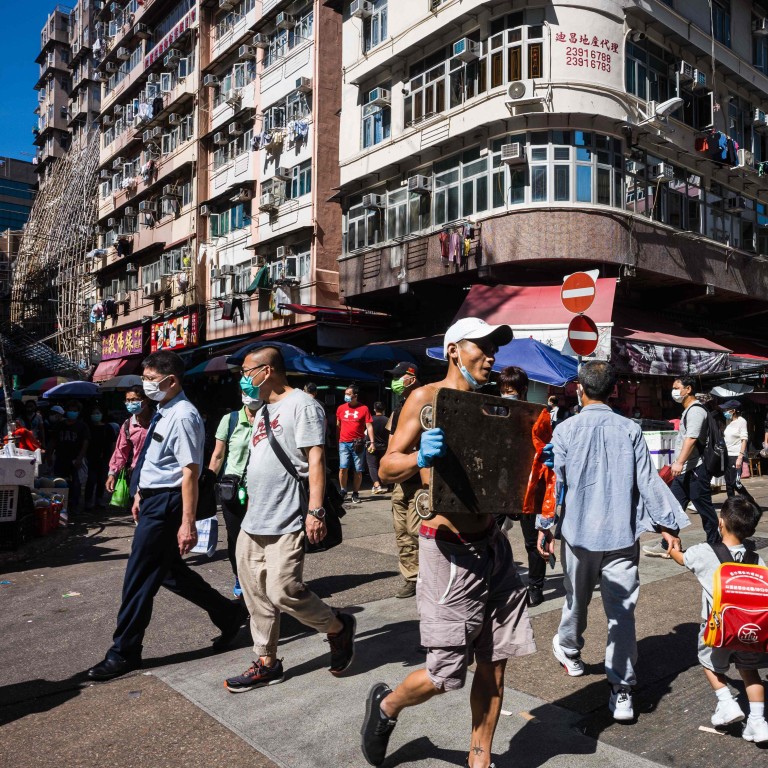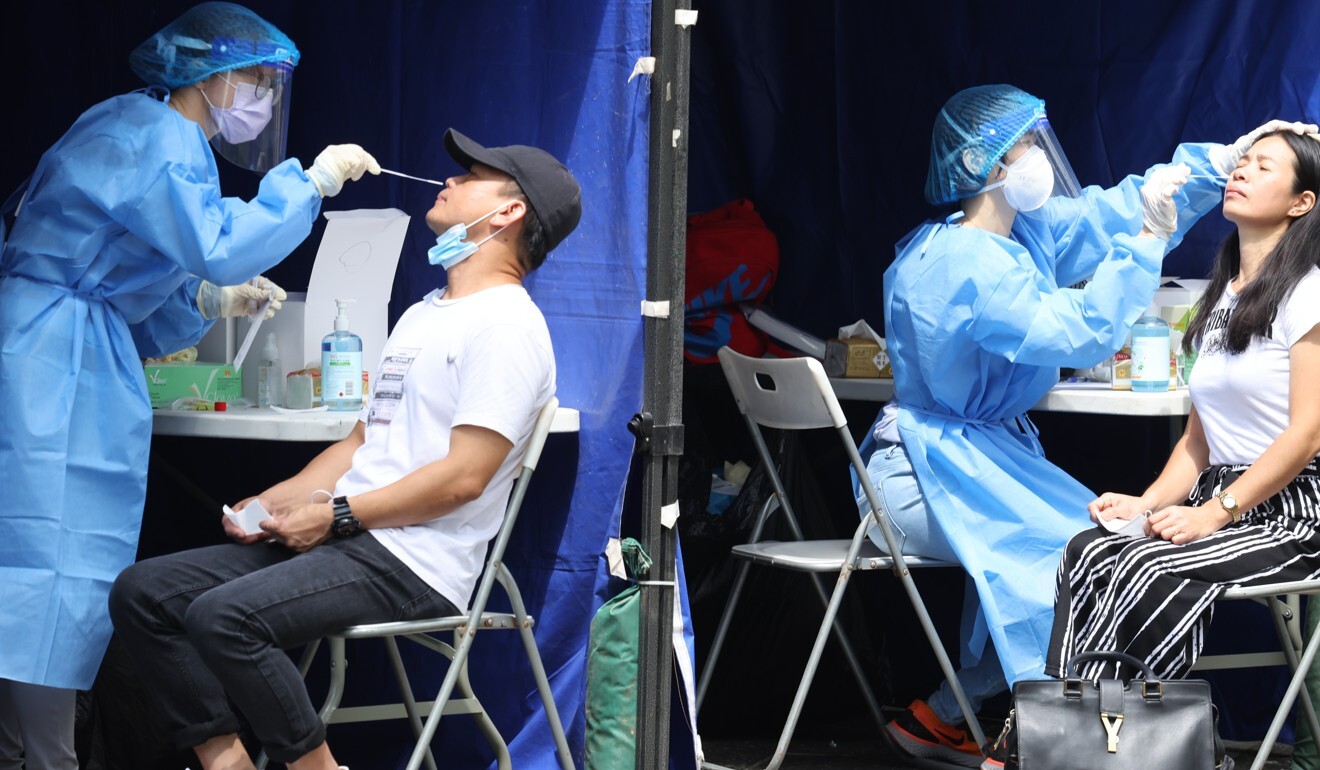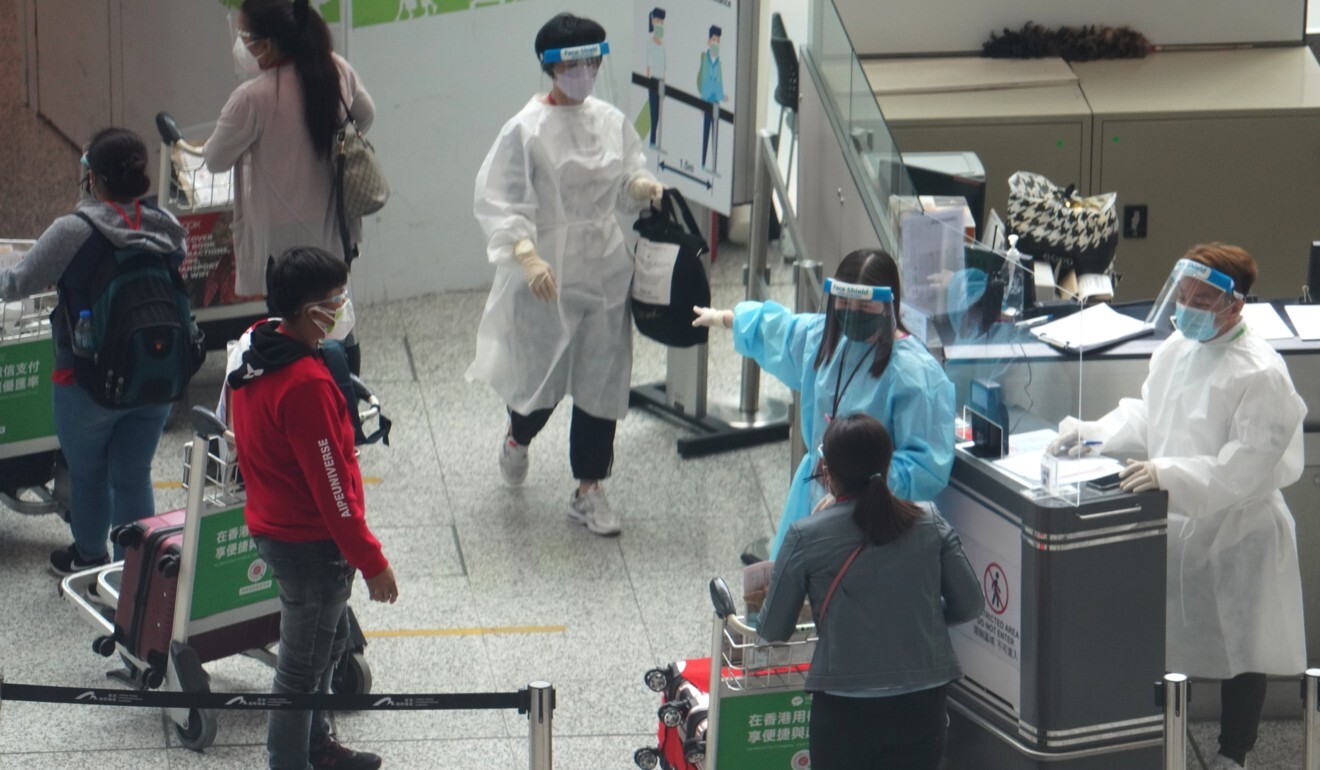
Coronavirus: halve Hong Kong quarantine for fully vaccinated arrivals from medium-risk countries, government advisers say
- Researchers separately tell Post that source of infection last week involving variant could remain a mystery after failed genome sequencing matches
- City confirms four new cases on Wednesday, all imported
Fully vaccinated travellers to Hong Kong from medium-risk countries should have their quarantine period cut to seven days upon testing positive for coronavirus antibodies, government scientific advisers have recommended.
Two scientific committees under the Centre for Health Protection raised the travel advice after a meeting on Wednesday, and gave their backing to lowering the vaccination age threshold to 12, a move authorities had said would kick in later this month.
The experts also renewed guidelines deeming full-day, in-person classes safe for schools with a 70 per cent vaccination rate, and declared it suitable for the elderly in care homes who have had flu shots to receive Covid-19 jabs.
The policy suggestions were passed to officials for consideration as Hong Kong confirmed four new coronavirus infections, all imported, from Lebanon, Sri Lanka, Indonesia and Austria. The new cases brought the official tally to 11,872, with 210 related deaths.
Fewer than five people tested preliminary-positive.
Meanwhile, researchers told the Post the source of a variant Covid-19 infection last week that snapped Hong Kong’s 42-day streak of zero untraceable cases could remain a mystery, after a failed bid to match tens of thousands of local and worldwide virus genomes.

On the recommendations for officials, Professor David Hui Shu-cheong, chairman of the Scientific Committee on Emerging and Zoonotic Diseases, said the presence of IgG antibodies could show vaccines were working.
He added that this meant fully inoculated arrivals from medium-risk countries, such as Spain and South Korea, could have their quarantine period halved, provided they monitored their health for another seven days.
Hong Kong already has a seven-day quarantine period for vaccinated arrivals from low-risk countries, a mark which would remain unchanged.
Recovered Covid-19 patients could have the same arrangement if they had received a first vaccine dose, according to the scientists, who added that the proof of antibodies presented by travellers would be valid for three months.
For the lowering of the vaccination age threshold to 12, Professor Lau Yu-lung, chairman of the Scientific Committee on Vaccine Preventable Diseases, recommended that campuses with a vaccination rate of more than 70 per cent should be allowed to hold maskless outdoor sports activities.
Hong Kong has so far only confirmed 970 coronavirus patients under the age of 18, and up to 40 per cent of them had been asymptomatic, as opposed to some 20 per cent of older adults who presented no symptoms.
But Lau, a paediatrician, said he had observed one young patient developing multisystem inflammatory syndrome, and urged teens to get vaccinated.
As vaccine age limit falls to 12, Hong Kong parents, pupils wait and see
He made a similar call for the city’s elderly, warning that those above 80 had the lowest vaccination rate among age groups, but were also most vulnerable to Covid-19 complications and death.
Hui said his panel had looked at overseas data on the efficacy and safety of mixing vaccines from different producers, and concluded that travellers who had taken an AstraZeneca jab in Britain or a Moderna shot in the United States for example, should opt for the German-made BioNTech vaccine as their second jab in Hong Kong, since data on mixed doses from the Chinese-produced Sinovac vaccine was lacking.
Separately, as experts raced to identify the infection source of a teen found with a coronavirus variant last Friday, Professor Leo Poon Lit-man from the University of Hong Kong’s school of public health said the investigation could be fruitless despite the efforts.
“It’s possible that we can’t find [the source], and it could turn out to be a dead end,” Poon said.
Experts said they believed the patient, who contracted the Alpha variant first identified in Britain, was linked to imported cases as local infections recorded showed no traces of the coronavirus type.
The girl’s mother and sister were also later confirmed with the same mutation.
US$14.5 million in lottery prizes, perks for vaccinated Hongkongers
Dr Gilman Siu Kit-hang, an associate professor from Polytechnic University who was also involved in genetic analysis of local Covid-19 cases, had compared genome sequencing of the virus from the girl with those of imported cases in late April. Her sample was also compared with the sequences in an international database of some 70,000 global cases with the same Alpha variant recorded between April and May.
“It’s quite interesting that the case doesn’t match closely with some 70,000 other cases documented so far in the world. Further investigation is needed,” Siu said.
He added that cases carrying the most similar sequences to that of the girl were from Norway and Sweden, but there were still some 15 genetic differences between them.
There were also no matches from the database with genomes from Taiwan, Guangdong province in mainland China and Indonesia.

Poon from HKU explained there were limitations with the database, run by a global initiative, as it was not exhaustive, and its records only came from willing countries or those with abilities to conduct extensive sequencing.
“Some countries are not able to do so, and so the database won’t have their data. For example, there is sparse sequencing data from Nepal,” he said.
Poon’s team also failed to find any matching genomes in screening of recent local cases.
But he added that this did not mean all was lost as the government could ramp up the tightening of testing measures for arrivals and continue to follow up on people who had been in contact with the patients.
The Department of Health stated on Wednesday it was still comparing the data from the girl and her family members with recent imported cases that carried the same mutation.

